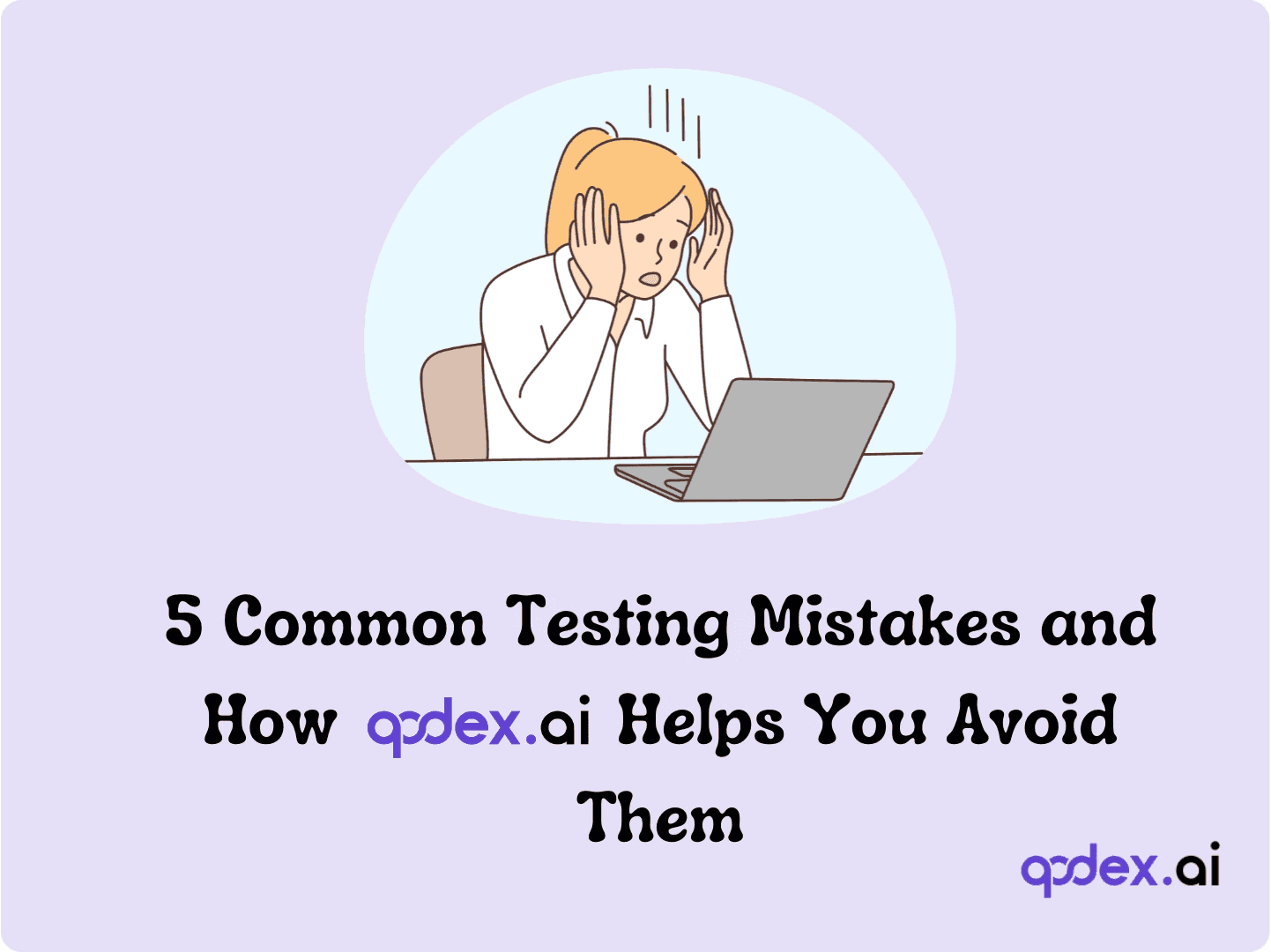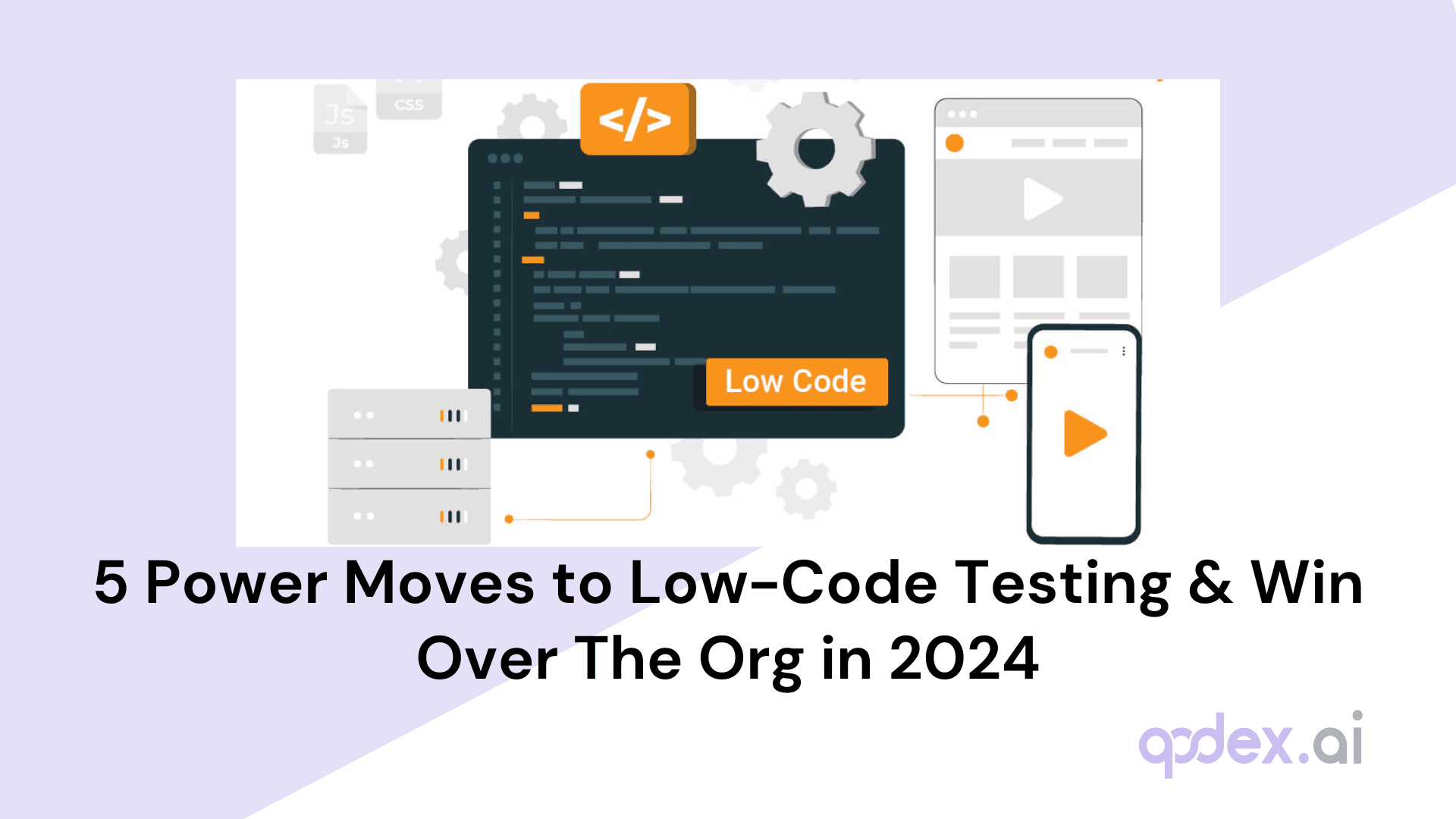AI Takes Over: Future of Quality Assurance
Introduction to AI in Quality Assurance
AI has significantly transformed various aspects of software development, particularly in quality assurance (QA).
Agile methodologies have shifted the focus towards faster and more reliable software delivery, and AI plays a crucial role in achieving these goals.
AI Quality Assurance Defined: AI in QA leverages technologies such as Natural Language Processing (NLP), machine learning, and computer vision to automate and enhance testing processes.
These technologies help generate test cases, detect errors, and predict potential defects, thereby improving the overall quality of software products.
Natural Language Processing (NLP) for Test Case Generation
NLP allows for the automated creation of test cases based on user stories and requirements. This significantly reduces the time and effort required to develop test scripts manually.
By understanding the natural language used in documentation, AI can generate relevant and comprehensive test cases, ensuring thorough coverage.
Tools like Qodex.ai take advantage of NLP to produce detailed and accurate test scenarios, ensuring your software meets the highest standards.
Machine Learning to Adapt and Fine-Tune Recommendations
Machine learning algorithms can analyze past test results and user feedback to adapt and improve testing strategies.
This ensures that the testing process becomes more efficient and accurate over time.
Machine learning models learn from previous tests and continuously refine their recommendations, optimizing test case selection and execution.
Computer Vision for Visual Regression Testing
Computer vision technology enables visual regression testing, which compares visual elements of the application to detect any unintended changes.
This is crucial for maintaining the UI/UX consistency of the application. By analyzing screenshots and visual elements, AI can identify discrepancies that might be missed by manual testing.
Integrating a tool like Qodex.ai can help seamlessly identify and rectify visual discrepancies, maintaining UI consistency.
As QA teams face increasing pressure to deliver higher-quality software faster, leveraging AI tools like Qodex.ai can be a game-changer, automating repetitive tasks and enhancing efficiency.
Challenges in Manual Testing and the Potential of AI to Address These
Manual testing can be time-consuming, error-prone, and unable to keep up with the rapid pace of modern software development. AI addresses these challenges by automating repetitive tasks, reducing human error, and enabling faster and more comprehensive testing.
Time-Consuming: Manual testing requires significant time investment for repetitive tasks. AI automates these tasks, freeing up time for more strategic activities.
Error-Prone: Human error can lead to inconsistent test results. AI provides consistent and reliable test execution.
Pace of Development: Modern development practices demand rapid iteration. AI keeps pace by automating tests and providing real-time feedback.
In the following sections, we will explore how AI drives the evolution towards autonomous software testing, its role in enhancing QA, and the advantages of integrating AI into QA processes.
We'll also discuss the challenges and solutions in AI-powered QA and review some of the top AI testing tools and frameworks available today.
Evolution Towards Autonomous Software Testing
The journey from manual testing to fully autonomous testing is a progressive one, where each stage builds upon the advancements of the previous one.
This evolution is important for enhancing efficiency, accuracy, and coverage in quality assurance.
Continuum from Manual, Through Automated, to Autonomous Testing
Manual Testing:
Definition: Involves human testers manually executing test cases without the aid of tools or scripts.
Limitations: Time-consuming, prone to human error, and not scalable for large projects.
Automated Testing:
Definition: Uses scripts and tools to execute test cases automatically.
Benefits: Faster execution, repeatability, and reduced human error. However, it requires initial setup and maintenance of test scripts.
Qodex.ai: Provides advanced automation capabilities, leveraging AI to maintain and execute test cases with minimal manual intervention.
Autonomous Testing:
Definition: AI-driven testing that not only automates test execution but also autonomously generates, executes, and maintains test cases without human intervention.
Benefits: Maximizes efficiency and coverage, continuously learns from past tests to improve future testing strategies.
Qodex.ai exemplifies autonomous testing by utilizing AI to adapt and optimize test cases continuously, ensuring comprehensive test coverage and proactive defect detection.
Role of AI and Machine Learning in Evolving QA Methodologies
AI and machine learning are pivotal in transforming QA methodologies from traditional approaches to more advanced, autonomous systems. They bring several enhancements:
Adaptive Learning: AI algorithms learn from historical data and ongoing test results, refining their testing strategies over time.
Predictive Analysis: Machine learning models predict potential defects and performance issues before they occur, allowing teams to address them proactively.
Automation of Complex Tasks: AI can automate complex tasks such as test case generation, visual regression testing, and performance monitoring.
Qodex.ai utilizes machine learning to analyze past test results and user feedback, continuously adapting its testing strategies for improved efficiency and accuracy.
Read about API test automation: qodex.ai/blog/what-is-api-automation-testing
Benefits of AI-Led Autonomous Testing
Efficiency:
Reduced Testing Time: Automated and autonomous testing significantly reduce the time required for testing cycles.
Resource Optimization: Minimizes the need for human intervention, allowing QA teams to focus on more strategic activities.
Coverage:
Comprehensive Testing: Autonomous testing ensures thorough coverage by continuously adapting and expanding test cases.
Consistent Execution: Ensures tests are executed consistently across different environments and scenarios.
Predictive Analytics:
Early Defect Detection: AI-driven predictive analytics identify potential defects early in the development cycle.
Proactive Issue Resolution: Allows teams to address issues before they impact the end-users, improving overall product quality.
Qodex.ai provides comprehensive test coverage and predictive analytics, leveraging AI to detect potential defects early and optimize the testing process continuously.
In the next sections, we will look into the specific roles AI plays in enhancing quality assurance, the advantages of integrating AI into QA processes, and the challenges and solutions associated with AI-powered QA.
Advantages of Integrating AI in Quality Assurance Processes
Integrating AI into quality assurance (QA) processes offers numerous benefits that enhance the efficiency, accuracy, and overall effectiveness of testing. Here are the key advantages:
Expedited Testing Timelines through Rapid Error Detection
Rapid Error Detection:
Automated Identification: AI can quickly identify errors and anomalies that might be missed during manual testing.
Real-Time Feedback: Provides instant feedback to developers, allowing for immediate fixes and reducing the overall testing cycle time.
Qodex.ai utilizes advanced AI algorithms to detect errors in real-time, significantly speeding up the testing process and reducing the time to market.
Automatic Scenario Generation and Test Planning Enhancement
Scenario Generation:
Dynamic Test Cases: AI can automatically generate test scenarios based on user behavior and historical data.
Comprehensive Coverage: Ensures that all possible user interactions are tested, enhancing the reliability of the application.
Qodex.ai automatically generates and updates test scenarios, ensuring comprehensive test coverage without manual intervention.
Test Planning Enhancement:
Optimized Test Plans: AI analyzes past test results and user feedback to create optimized test plans that focus on high-risk areas.
Efficiency: Reduces the time spent on planning and increases the efficiency of the QA process.
High Scalability and Comprehensive Test Coverage
Scalability:
Handling Large Projects: AI can manage and execute tests across large and complex projects, ensuring scalability without additional manual effort.
Resource Efficiency: AI-driven tools can optimize resource allocation, ensuring that testing processes are not constrained by human limitations.
Qodex.ai offers high scalability, allowing teams to handle extensive test cases and large projects efficiently.
Comprehensive Coverage:
All-Inclusive Testing: Ensures that all aspects of the application are tested, from functional and performance testing to security and regression testing.
Consistent Execution: AI-driven tests are consistently executed, reducing variability and increasing reliability.
Advancements in Test Case Quality and Regression Testing
Test Case Quality:
Precision: AI refines test cases based on continuous learning from past executions, improving their precision and relevance.
Adaptability: Adapts to changes in the application, ensuring that test cases remain up-to-date and effective.
Qodex.ai continuously maintains and refines test cases, ensuring high quality and relevance.
Regression Testing:
Automated Regression Tests: AI automates regression tests, ensuring that new changes do not introduce new defects.
Efficient Updates: Quickly updates regression tests to reflect recent changes, maintaining comprehensive coverage.
Qodex.ai provides automated regression testing, ensuring that all updates are thoroughly tested without additional manual effort.
Visual UI Testing and AI-Based Bug Tracking for Enhanced Accuracy
Visual UI Testing:
Visual Comparison: AI uses computer vision to compare UI elements and detect any visual discrepancies.
Consistency: Ensures that the UI remains consistent across different platforms and updates.
Qodex.ai employs computer vision for visual UI testing, providing accurate and reliable results.
AI-Based Bug Tracking:
Automated Bug Detection: AI identifies and tracks bugs automatically, reducing the reliance on manual bug reports.
Prioritization: AI can prioritize bugs based on their impact, helping teams focus on the most critical issues first.
Qodex.ai utilizes AI-based bug tracking to streamline the detection and resolution process, ensuring high accuracy and efficiency.
Integrating AI into QA processes offers substantial benefits that enhance the speed, accuracy, and scalability of testing. Tools like Qodex.ai exemplify the potential of AI in QA, providing comprehensive coverage, real-time error detection, and continuous optimization.
AI Testing Tools and Frameworks
AI-driven testing tools and frameworks are revolutionizing the quality assurance landscape by providing enhanced efficiency, accuracy, and automation. Here’s a look at some of the top AI testing tools available today.
1. Qodex.ai
Overview: Qodex.ai is a cutting-edge AI-driven automation testing tool designed to enhance the software development lifecycle by providing comprehensive, continuous test coverage.
Features:
AI Software Test Engineer: Integrates seamlessly with development teams to automate and optimize the testing process.
Continuous Test Coverage: Ensures maximum test coverage with an AI agent that maintains functional test cases for API and UI testing.
Read more about automating API testing with AI: qodex.ai/blog/automate-api-testing-with-ai-in-30-minutes
Integration: Compatible with popular tech stacks, development tools, and workflows. Connects with team tools to understand business nuances and product flows.
Workflow Optimization: Quickly build, review, and maintain test suites. Configure test execution with CI/CD, schedule, or ad-hoc local testing.
Read more about CI/CD trends here: qodex.ai/blog/cicd-trends
Efficiency: Ship bug-free software 200% faster with a 90% reduction in bugs and 80% reduction in QA costs.
Cost-Effective: Achieve results with only 20% of the traditional testing budget.
For more information, visit Qodex.ai.
2. Katalon Studio
Overview: Katalon Studio is an all-in-one test automation solution for API, web, mobile, and desktop applications. It is known for its comprehensive feature set and ease of use.
Features:
Automated Test Generation: Quickly generate automated tests with minimal setup.
Cross-Platform Support: Supports API, web, mobile, and desktop testing.
Integrations: Compatible with CI/CD tools and other development platforms.
Reporting and Analytics: Provides detailed reports and analytics to track testing progress and results.
3. Applitools
Overview: Applitools specializes in AI-powered visual testing, ensuring that applications look and function correctly across different devices and browsers.
Features:
Visual AI: Uses advanced AI algorithms to perform visual regression testing.
Cross-Browser Testing: Ensures visual consistency across various browsers and devices.
Integration: Integrates with popular CI/CD tools and testing frameworks.
Smart Analysis: Provides smart analysis of visual changes to identify critical issues.
4. Testsigma
Overview: Testsigma is a cloud-based test automation platform designed to simplify the testing process with its no-code and low-code capabilities.
Features:
No-Code Test Creation: Allows users to create automated tests without any coding skills.
Cross-Platform Support: Supports testing for web, mobile, and desktop applications.
Continuous Testing: Integrates seamlessly with CI/CD pipelines for continuous testing.
Analytics and Reporting: Offers detailed analytics and reporting features to monitor test results.
5. SauceLabs
Overview: SauceLabs is a cloud-based platform that provides comprehensive automated testing for web and mobile applications.
Features:
Cross-Browser Testing: Supports testing across multiple browsers and devices.
Mobile Testing: Offers real device and simulator/emulator testing for mobile applications.
CI/CD Integration: Easily integrates with popular CI/CD tools to automate testing workflows.
Detailed Reporting: Provides detailed reports and logs to track test results and identify issues
These tools represent some of the best AI-driven testing solutions available today. Each offers unique features that cater to various aspects of quality assurance, from automated test generation to comprehensive visual testing.
By integrating these tools into your development workflow, you can significantly enhance the efficiency, accuracy, and scalability of your QA processes.
Conclusion
The integration of AI into quality assurance is transforming the way software is tested and delivered. Tools like Qodex.ai, Katalon Studio, Applitools, Test Sigma, and SauceLabs offer advanced features that streamline the testing process, enhance test coverage, and improve overall efficiency.
By adopting these AI-driven tools, development teams can achieve faster release cycles, reduce costs, and ensure the delivery of high-quality, bug-free software.
For more insights on how Qodex.ai can revolutionize your testing processes with its AI-driven capabilities, visit Qodex.ai to get early access to the automation testing features. Embrace the future of API testing and ensure your software meets the highest standards of quality and reliability.
Frequently Asked Questions
Why should you choose Qodex.ai?
Qodex.ai simplifies and accelerates the API testing process by leveraging AI-powered tools and automation. Here's why it stands out:
- AI-Powered Automation
Achieve 100% API testing automation without writing a single line of code. Qodex.ai’s cutting-edge AI reduces manual effort, delivering unmatched efficiency and precision.
- User-Friendly Platform
Effortlessly import API collections from Postman, Swagger, or application logs and begin testing in minutes. No steep learning curves or technical expertise required.
- Customizable Test Scenarios
Whether you’re using AI-assisted test generation or creating test cases manually, Qodex.ai adapts to your needs. Build robust scenarios tailored to your project requirements.
- Real-Time Monitoring and Reporting
Gain instant insights into API health, test success rates, and performance metrics. Our integrated dashboards ensure you’re always in control, identifying and addressing issues early.
- Scalable Collaboration Tools
Designed for teams of all sizes, Qodex.ai offers test plans, suites, and documentation that foster seamless collaboration. Perfect for startups, enterprises, and microservices architecture.
- Cost and Time Efficiency
Save time and resources by eliminating manual testing overhead. With Qodex.ai’s automation, you can focus on innovation while cutting operational costs.
- Continuous Integration/Delivery (CI/CD) Compatibility
Easily integrate Qodex.ai into your CI/CD pipelines to ensure consistent, automated testing throughout your development lifecycle.
How can I validate an email address using Python regex?
You can use the following regex pattern to validate an email address: ^[a-zA-Z0-9._%+-]+@[a-zA-Z0-9.-]+\.[a-zA-Z]{2,}$
What is Go Regex Tester?
Go Regex Tester is a specialized tool for developers to test and debug regular expressions in the Go programming environment. It offers real-time evaluation of regex patterns, aiding in efficient pattern development and troubleshooting
Discover, Test, & Secure your APIs 10x Faster than before
Auto-discover every endpoint, generate functional & security tests (OWASP Top 10), auto-heal as code changes, and run in CI/CD - no code needed.
Related Blogs


